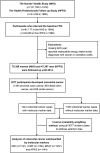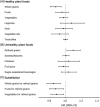Healthy and unhealthy plant-based diets in relation to the incidence of colorectal cancer overall and by molecular subtypes
- PMID: 35998061
- PMCID: PMC9398226
- DOI: 10.1002/ctm2.893
Healthy and unhealthy plant-based diets in relation to the incidence of colorectal cancer overall and by molecular subtypes
Abstract
Background: Plant-based foods have been recommended for health. However, not all plant foods are healthy, and little is known about the association between plant-based diets and specific molecular subtypes of colorectal cancer (CRC). We examined the associations of healthy and unhealthy plant-based diets with the incidence of CRC and its molecular subtypes.
Methods: While 123 773 participants of the Nurses' Health Study and the Health Professionals Follow-up Study had been followed up (3 143 158 person-years), 3077 of them had developed CRC. Healthy and unhealthy plant-based diet indices (hPDI and uPDI, respectively) were calculated using repeated food frequency questionnaire data. We determined the tumoural status of microsatellite instability (MSI), CpG island methylator phenotype (CIMP), and BRAF and KRAS mutations.
Results: Higher hPDI was associated with lower CRC incidence (multivariable hazard ratio [HR] comparing extreme quartiles, 0.86, 95% confidence interval [CI]: 0.77, 0.96; P-trend = .04), whereas higher uPDI was associated with higher CRC incidence (multivariable HR comparing extreme quartiles, 1.16, 95% CI: 1.04, 1.29; P-trend = .005). The association of hPDI significantly differed by KRAS status (P-heterogeneity = .003) but not by other tumour markers. The hPDI was associated with lower incidence of KRAS-wildtype CRC (multivariable HR comparing extreme quartiles, 0.74, 95% CI: 0.57, 0.96; P-trend = .004) but not KRAS-mutant CRC (P-trend = .22).
Conclusions: While unhealthy plant-based diet enriched with refined grains and sugar is associated with higher CRC incidence, healthy plant-based diet rich in whole grains, fruits and vegetables is associated with lower incidence of CRC, especially KRAS-wildtype CRC.
Keywords: colorectal carcinoma; inverse probability weighting; molecular pathological epidemiology; sustainability.
© 2022 The Authors. Clinical and Translational Medicine published by John Wiley & Sons Australia, Ltd on behalf of Shanghai Institute of Clinical Bioinformatics.
Conflict of interest statement
ATC has served as an investigator on a separate study of personalised diet sponsored by Zoe Global Ltd. MG receives research funding from Bristol‐Myers Squibb, Merck, Servier and Janssen. JAM has received institutional research funding from Boston Biomedical, has served as an advisor/consultant to COTA Healthcare, and served on a grant review panel for the National Comprehensive Cancer Network funded by Taiho Pharmaceutical.
Figures


Similar articles
-
Dietary Patterns and Risk of Colorectal Cancer: Analysis by Tumor Location and Molecular Subtypes.Gastroenterology. 2017 Jun;152(8):1944-1953.e1. doi: 10.1053/j.gastro.2017.02.015. Epub 2017 Feb 27. Gastroenterology. 2017. PMID: 28249812 Free PMC article.
-
Risk Factors and Incidence of Colorectal Cancer According to Major Molecular Subtypes.JNCI Cancer Spectr. 2020 Oct 7;5(1):pkaa089. doi: 10.1093/jncics/pkaa089. eCollection 2021 Feb. JNCI Cancer Spectr. 2020. PMID: 33442661 Free PMC article.
-
Dietary intake of fiber, whole grains and risk of colorectal cancer: An updated analysis according to food sources, tumor location and molecular subtypes in two large US cohorts.Int J Cancer. 2019 Dec 1;145(11):3040-3051. doi: 10.1002/ijc.32382. Epub 2019 May 21. Int J Cancer. 2019. PMID: 31044426 Free PMC article.
-
Associations between colorectal cancer molecular markers and pathways with clinicopathologic features in older women.Gastroenterology. 2013 Aug;145(2):348-56.e1-2. doi: 10.1053/j.gastro.2013.05.001. Epub 2013 May 7. Gastroenterology. 2013. PMID: 23665275 Free PMC article.
-
Methylator phenotype in colorectal cancer: A prognostic factor or not?Crit Rev Oncol Hematol. 2016 Mar;99:74-80. doi: 10.1016/j.critrevonc.2015.11.001. Epub 2015 Dec 7. Crit Rev Oncol Hematol. 2016. PMID: 26702883 Review.
Cited by
-
Association between Different Types of Plant-Based Diets and Dyslipidemia in Middle-Aged and Elderly Chinese Participants.Nutrients. 2023 Jan 2;15(1):230. doi: 10.3390/nu15010230. Nutrients. 2023. PMID: 36615887 Free PMC article.
-
Yacon (Smallanthus sonchifolius) Flour Reduces Inflammation and Had No Effects on Oxidative Stress and Endotoxemia in Wistar Rats with Induced Colorectal Carcinogenesis.Nutrients. 2023 Jul 24;15(14):3281. doi: 10.3390/nu15143281. Nutrients. 2023. PMID: 37513699 Free PMC article.
-
Causal associations between dietary factors and colorectal cancer risk: a Mendelian randomization study.Front Nutr. 2024 May 1;11:1388732. doi: 10.3389/fnut.2024.1388732. eCollection 2024. Front Nutr. 2024. PMID: 38751740 Free PMC article.
-
Association of Healthful Plant-based Diet Adherence With Risk of Mortality and Major Chronic Diseases Among Adults in the UK.JAMA Netw Open. 2023 Mar 1;6(3):e234714. doi: 10.1001/jamanetworkopen.2023.4714. JAMA Netw Open. 2023. PMID: 36976560 Free PMC article.
-
Heterogeneity of the tumor immune microenvironment and clinical interventions.Front Med. 2023 Aug;17(4):617-648. doi: 10.1007/s11684-023-1015-9. Epub 2023 Sep 20. Front Med. 2023. PMID: 37728825 Review.
References
-
- Sung H, Ferlay J, Siegel RL, et al. Global cancer statistics 2020: GLOBOCAN estimates of incidence and mortality worldwide for 36 cancers in 185 countries. CA Cancer J Clin. 2021;71(3):209–249. - PubMed
-
- World Cancer Research Fund/American institute for cancer research . Diet, Nutrition, Physical Activity and Colorectal Cancer. 2017.
Publication types
MeSH terms
Substances
Grants and funding
LinkOut - more resources
Full Text Sources
Medical
Research Materials
Miscellaneous
